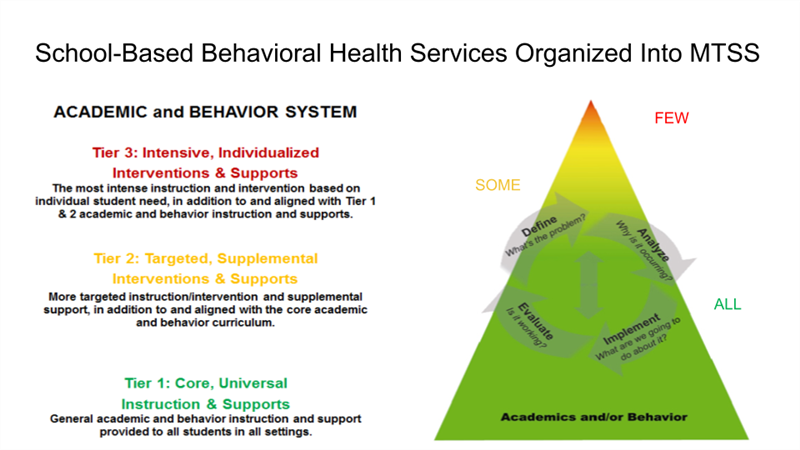Welcome to the Behavioral Health webpage for Princeton City Schools
Over the past few years, we have been expanding our partnerships with community and health providers to assemble an array of services and supports. This is an ongoing process that is driven by changes in funding streams and student/family access to coverage.
Due to income guidelines, some students qualify for Ohio Medicaid (public assistance) which is a major funding stream for our community mental health partners. Many other students rely on their family private health insurance coverage (which can be limited) and then quite a few other students have no health coverage due to immigrant status or other factors.
As a district with a diverse student population, we have to continually assess where mental health access gaps exist and how we can partner to fill these gaps so that we have a comprehensive framework that can adjust to the needs of our students and how those needs shift and distribute across our schools.
Currently, Princeton City Schools has partnerships to provide school-based mental health services in each of the 11 schools to address social-emotional and behavioral health needs in order to maximize academic achievement.
As part of the Princeton Academic Achievement Plan, Strategic Plan (Goal 5: Health & Safety), and Equity Plan, the district applies a Multi-tiered System of Supports (MTSS) framework. This ranges from offering services universally to all students to provide intensive services to a smaller, targeted population of students.
Work to outline an array of services and supports is ongoing, student-centered, and aligned to Ohio’s Whole Child Framework” - part of ODE’s “Each Child, Our Future” strategic plan.

Behavioral Health Service Tiers
Levels of tiered services and supports are offered within each school. Below is a general overview of the tiered levels.
1. Core Universal Prevention Services and Supports (Tier 1) All Students
Accessible to all students within the school community
The goal of these activities is to create positive school climate that reinforces positive behavior and supports resiliency
Emphasis is placed upon the promotion of pro-social skill development among children and youth
Program examples of school staff support include staff professional development, social skill building for students, and evidenced-based/informed school-wide or classroom-based programs
2. Targeted Supplemental Interventions and Supports (Tier 2) Some Students
A smaller number of students are likely to access these services
Mental health partners can provide consultation and support to school teachers and staff to develop child/youth-specific strategies to address identified educational or behavioral concerns
These interventions can include involvement in support groups, skill-building groups such as social skill development or anger management groups, and training/consultation for teachers and other school personnel.
3. Individualized Interventions and Intensive Supports (Tier 3) Few Students
A very small number of students are likely to require individualized support to assist the child/youth to improve functioning in school
This level of support is designed for students who have active mental health needs
Here’s an outline of Behavioral Health Services and Supports as part of our Multi-tiered System of Supports:
Behavioral Health, Prevention & Social-Emotional Learning Programs at Princeton City Schools
Here you can find resources for many areas within mental health, whether you are a student, guardian, employee, or community member. Learn about resources within our school as well as our community.
